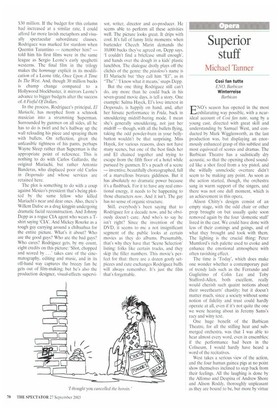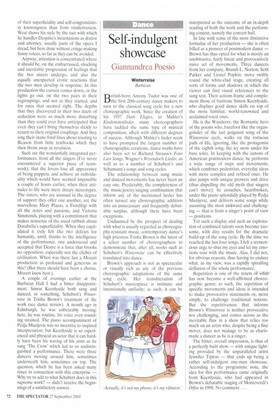Superior stuff
Michael Tanner
Cosi fan tutte ENO, Barbican Winterreise Barbican
ENO's season has opened in the most 1..../exhilarating way possible, with a nearideal account of Cosi fan suite, sung by a young cast, directed with great skill and understanding by Samuel West, and conducted by Mark Wigglesworth, as the last production was, but displaying an enormously enhanced grasp of this subtlest and most equivocal of scores and dramas. The Barbican Theatre has a sadistically dry acoustic, so that the opening chord sounded like a shot fired from a toy pistol, and the wilfully unmelodic overture didn't seem to be making any point. As soon as the action started, though, the orchestra sang in warm support of the singers, and there was not one dull moment, which is an achievement in this opera.
Alison Chitty's designs consist of an empty stage, with the odd chair or other prop brought on but usually quite soon removed again by the four 'domestic staff listed in the cast. We could have done with less of their comings and goings, and of what they brought and took with them. The lighting is the crucial thing; Peter Mumford's rich palette used to evoke and enhance the emotional atmosphere with often ravishing effect.
The time is 'Today', which does make one wonder whether a contemporary pair of trendy lads such as the Ferrando and Guglielmo of Colin Lee and Toby Stafford-Allen, both excellent, really would cherish such quaint notions about their sweethearts' chastity; but it doesn't matter much, since a society without some notion of fidelity and trust could hardly operate at all, even if it's not quite the one we were hearing about in Jeremy Sams's racy and witty text.
One huge benefit of the Barbican Theatre, for all the stifling heat and submerged orchestra, was that I was able to hear almost every word, even in ensembles; if the performance had been in the Coliseum, I would hardly have heard a word of the recitatives.
West takes a serious view of the action, and the four human guinea pigs at no point show themselves inclined to step back from their feelings. All the laughing is done by the Alfonso and Despina of Andrew Shore and Alison Roddy, thoroughly unpleasant as they are bound to be, but more by virtue of their superficiality and self-congratulatory knowingness than from vindictiveness. West shows his style by the tact with which he handles Despina's incarnations as doctor and attorney, usually parts of the opera I dread, but here done without cringe-making funny voices, so far as they can be avoided.
Anyway, attention is concentrated where it should be, on the embarrassed, shocking and inevitable progression of feelings that the two sisters undergo, and also the equally unexpected erotic reactions that the two men develop in response. In this production the curtain comes down, or the lights go out, on the two pairs in their regroupings, and not as they started, and for once that seemed right. The depths that they discovered in their two duets of seduction were so much more disturbing than they could ever have anticipated that even they can't bring themselves slickly to return to their original couplings. And they sing their inane final lines about trusting to Reason from little textbooks which they then throw away in revulsion.
Such are the wonderfully integrated performances, from all the singers (I've never encountered a superior piece of teamwork), that the lovers lose all appearance of being puppets, and achieve an individuality which would have seemed impossible a couple of hours earlier, when their attitudes to life were mere dreary stereotypes. The sisters, who are unusual in the degree of support they offer one another, are the marvellous Mary Plazas, a Fiordiligi with all the notes and passions, and Victoria Simmonds, playing with a commitment that makes nonsense of the usual rubbish about Dorabella's superficiality. When they capitulated it truly felt like two defeats for humanity, until, thanks to the intelligence of the performance, one understood and accepted that Desire is a force that brooks no opposition, especially not the clichés of civilisation. When was there last a Mozart production as profound and generous as this? (But there should have been a chorus. Mozart knew best.).
A couple of evenings earlier at the Barbican Hall I had a bitter disappointment. Simon Keenlyside both sang and danced, or something, Schubert's Winterreise in Trisha Brown's treatment of the work (see dance review). A month ago in Edinburgh, he was unbearably moving; here, he was routine, his voice even sounding strained. The piano accompaniment of Pedja Muzijevic was no incentive to inspired interpretation; but Keenlyside is so experienced and physical an actor that it can hardly have been his waving of his arms as he sang The Crow' which led to so undistinguished a performance. There were three dancers moving around him, sometimes underneath him, sometimes on top. The question, which he has been asked many times in connection with this enterprise — Why try to add to what Schubert does in this supreme work? — didn't receive the beginnings of a satisfactory answer.



























































































 Previous page
Previous page